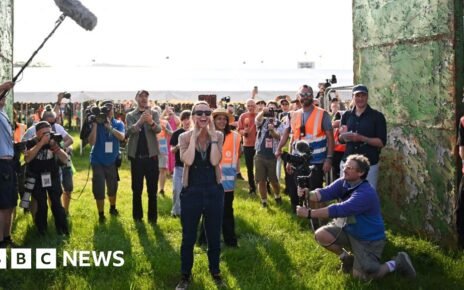[ad_1]
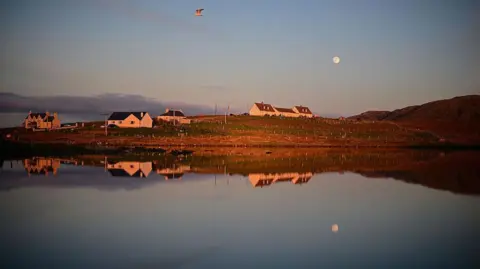 Getty Images
Getty ImagesIslanders on Lewis spend their Sundays in a way the rest of Scotland – and the UK – have not seen in decades.
Swimming pools and sports centres are closed and most businesses are shut.
Like the rest of the Western Isles there is no public transport on Sundays.
There is a strong tradition of Christian church-going on Lewis – and neighbouring Harris – with the Church of Scotland and Free Church predominant.
According to the latest Census figures, Church of Scotland (35.3%) was the most common religious group in the Western Isles.
But a row over the seven-day opening of a Tesco in Stornoway, Lewis, has brought this traditional way of life into focus. And today’s first Sunday opening marks a historical change.
Faithful observance of the Sabbath, or Lord’s Day, is embedded in the culture of Lewis and Harris.
According the Bible’s Ten Commandments, the Sabbath is a spiritual time for worship and rest from work and play.
In the past, islanders didn’t hang washing outside as a mark of respect for the Sabbath – and on occasions some church-goers even chained up children’s swings to help ensure peace and quiet.
Dr James Englinton is a a senior lecturer in Reformed Theology at Edinburgh University and has family from Lewis.
He said chaining swings had become a trope used by people who don’t understand island culture.
Dr Englinton added: “It’s very much projected on to that culture and that kind of stuff makes the Sabbath sound very dour, killjoy and weird.
“What you have on Lewis is a living example of a local culture that practices a day of rest as a community.
“On mainland Scotland people think that’s quite odd, but it’s a normal thing across continental Europe.”
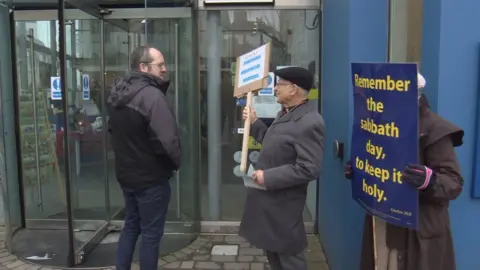
The Rev Hector Morrison, who is from Lewis and is principal of Highland Theological College UHI, said one reason for the longevity of Lewis and Harris’ Sunday traditions were evangelical revivals.
These were events when communities felt committed to a very pious way of Christianity.
The Rev Morrison says parts of Lewis and Harris experienced revivals every 10-15 years up until at least the 1970s.
He has fond memories of growing up in Lewis and says the Sabbath never seemed dour.
The former minister adds: “I believe that Sunday will remain special for Lewis and Harris people not primarily because it is so deeply embedded in the island’s culture, but as long as the gospel itself remains significant and powerfully at work in these islands.
“Each new generation which comes to love the Lord, will want to keep the Lord’s commandments.”
Other religions across the Western isles include Catholic, particularly in the southern isles including Barra, and there is a mosque in Stornoway.
For Lewis and Harris the last 20 years have seen significant changes to Sundays.
Hotels’ restaurants have opened and there is a petrol station with a shop trading on Sundays.
The island’s first commercial flights started in October 2002.
About 60 campaigners gathered to meet the plane when it landed at Stornoway.
They stood in quiet protest and handed out leaflets saying travelling on the Sabbath was a sin and damaging to a person’s soul and island life.
A young oil industry worker was among the passengers on that first flight.
He told the BBC at the time a Sunday air service offered him a chance to balance working away from home and getting back to spend quality time with his family.
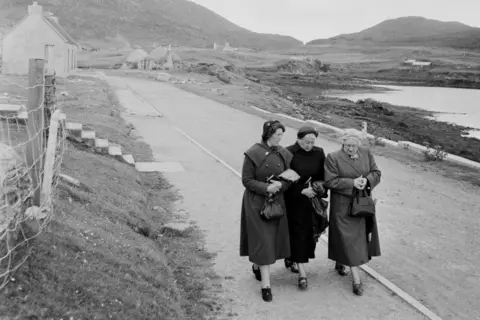 Getty Images
Getty ImagesSeven years later the first ferry – a lifeline form of transport in the Western Isles – sailed from Stornoway to mainland Scotland on a Sunday.
A small group prayed and sang a psalm as cars boarded the boat, but several hundred other people stood and clapped as a show of support for the sailing.

Among the protestors was Govan-born Free Church minister Rev Angus Smith.
He led a demonstration against Skye Sunday ferries in 1965 and was removed by police after sitting in front of cars waiting to board.
Then in 2018, a screening of Star Wars: The Last Jedi marked the first time a cinema was open on a Sunday in Lewis. There was a small protest outside.
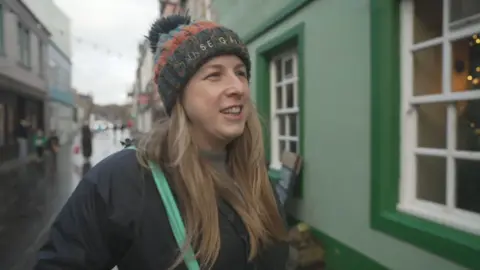
When it comes to Tesco islanders have mixed views.
Lizzie Aucott-Hall said: “The town has lots of other things open on a Sunday anyway so why not Tesco?
“If the place was shut I would understand but it’s not.
“If I can go and buy a pint of beer I should be able to buy a pint of milk.”
But Ruth Pickard is not in favour of the move.
She told BBC News: “I’m totally against it. We moved up here from Yorkshire 34 years ago and one of the attraction was the peace and quiet and the way of life.
“What you can’t buy six days a week, I don’t know what you need on a Sunday.”
Lewis-based BBC journalist Donald Lamont said the debate is not a simple one.
He told BBC Radio’s Good Morning Scotland: “It’s not as straight forward as those of a religious persuasion versus those who are not. It’s more nuanced than that.
“There are a lot of people expressing sadness, a lot of people are ambivalent and there are those who are pleased with the news.”
[ad_2]
Source link freeslots dinogame telegram营销


